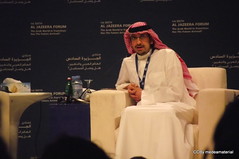
Forbes Middle East, an Arabic language business publication, has released a list of the top 100 Arab Twitter presences. Forbes’ research team adapted tweet data from Twitter Grader, a website where users can input a Twitter username and receive a grade for that account. The grade is based upon several criteria, including number of followers, influence (grade) of followers, and tweet frequency. Forbes’ team weighed these criteria differently, and arrived at their own list of the most influential Arab Twitter presences. The Forbes team removed royalty and members of ruling families from consideration, under the assumption that they possess an unfair advantage over the public in certain ranking criteria.
Because the Forbes team only took into account the number of followers and views an account received, as well as the number of tweets that account had each month, the list should not be considered a “best of Twitter.” The list’s criteria are purely quantitative; the actual content of an account’s tweets did not factor into the tweeters’ scores, which might account for certain surprising omissions.
Topping Forbes‘ list is Sultan Sooud Al-Qassemi (@SultanAlQassemi), a renowned Emirati Twitter personality, columnist, and fellow at the Dubai School of Government. He tweets primarily about developments in the Arab World, with particular emphasis on the Arab Spring, and has accumulated over 70,000 followers. The highest ranked women on the Forbes list are #48 Aseel al-Awadhi (@aseelalawadhi), one of the first female members of the Kuwaiti Parliament, and #52 Amira al-Hussaini (@justamira), the Bahraini editor of Global Voices Online’s Middle East and North Africa section.
In addition to an apparent gender disparity (women make up just 10% of the list), Forbes‘ findings reflect the relative penetration of Twitter in different regions of the Arab World, with some exceptions. According to the second issue of the Dubai School of Government’s Arab Social Media Report, the UAE, Qatar, Egypt, Saudi Arabia, and Kuwait lead the Arab World in Twitter usage, and are accordingly the most frequently appearing nations on Forbes‘ list. Certain Arab countries, including Syria, where Twitter was only recently unblocked, are sparsely represented on the list, while others, namely Sudan, Algeria, Mauritania, Libya, Oman and Palestine are absent entirely. Lebanon, despite having one of the largest Twitter communities in the Arab World, also did not appear on the list.
Read more about the Forbes team’s methodology (in Arabic).


